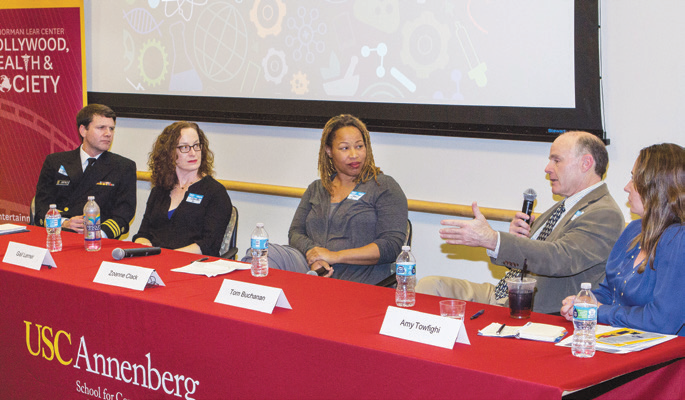Why the program was developed
Having close proximity to one of the world’s largest film industry hotbeds puts the Southern California Clinical and Translational Science Institute (SC CTSI) in a prime position to support health promotion and research efforts through entertainment media. Media and entertainment have the ability to reach millions of people in a short period of time, and it is important to consider how we can best leverage television, film and other entertainment media in the promotion of public health and research. For almost 20 years, Hollywood, Health & Society (HH&S) has worked with writers in the creative industry to answer that question. HH&S is a program of the USC Annenberg School of Communication’s Norman Lear Center that provides entertainment industry professionals with accurate and timely information for storylines on health, safety and national security. In addition to ensuring that health topics are presented with accuracy, HH&S strives to use entertainment media as a medium to promote public health education.
Through a collaborative effort between the Community Engagement team from the SC CTSI and the Director of HH&S, Kate Folb, we worked together to identify target topics related to underrepresentation of racial/ethnic minorities in clinical trials, diabetes, HIV/AIDS, and other key health issues. Starting in 2016, our partnership also resulted in the creation of educational materials, tip sheets and newsletters on these targeted health topics. In addition, HH&S and the SC CTSI engaged the entertainment industry by hosting a panel event with experts in medicine, health and research.
Purpose of the program
PANEL SPOTLIGHT: This panel event, titled “Clinical Trials So White: When Life-Saving Research Leaves People of Color Behind,” took place at Children’s Hospital Los Angeles (CHLA) on March 2, 2017. The event focused on the impact of clinical research trials on illnesses, particularly diabetes, obesity, heart disease and stroke. Panel discussions spotlighted how the low percentage of minority participation in research trials — especially among African Americans and Latinos — hampers discoveries of new treatments and impedes efforts to determine how treatments affect underrepresented populations. The event featured guest speakers Dr. Michele Kipke, co-director of SC CTSI and Professor of Pediatrics and Preventive Medicine at the USC Keck School of Medicine; Dr. Thomas Buchanan, director of the SC CTSI and head of one of the leading groups conducting research focused on diabetes among Latino communities; Dr. Zoanne Clack, executive producer on the ABC medical drama Grey’s Anatomy; Gail Lerner, co-executive producer and writer for the ABC comedy series black-ish; and other leading medical professionals. Fifty-five television writers, producers and other entertainment industry professionals attended the event, after which lively discussion continued during the reception.

How are the communities being engaged
PARTNERSHIP IN ACTION: As a result of these efforts, Grey’s Anatomy (ABC) aired a storyline on the topic of clinical trials and inflammatory breast cancer. The story spanned multiple episodes where Dr. Maggie Pierce learns the truth about her mother’s inflammatory breast cancer and begins to examine research information about the disease and its various treatments. Against her colleague’s advice, Maggie puts her mother, Diane, on an aggressive regimen, eventually securing her a place in a clinical trial for an experimental treatment. HH&S held multiple briefings with the writing team and Drs. Maria Nelson and Darcy Spicer from USC Keck School of Medicine to discuss symptoms of inflammatory breast cancer, treatment options and the latest information on clinical trials. The three episodes of the storyline each reached more than 7.5 million people in the United States.
The Grey’s Anatomy storyline won a 2017 Sentinel Award in the Drama category. The awards are presented by HH&S and the Centers for Disease Control and Prevention to recognize exemplary television storylines that inform, educate and motivate viewers to make choices for healthier and safer lives.